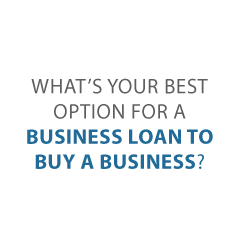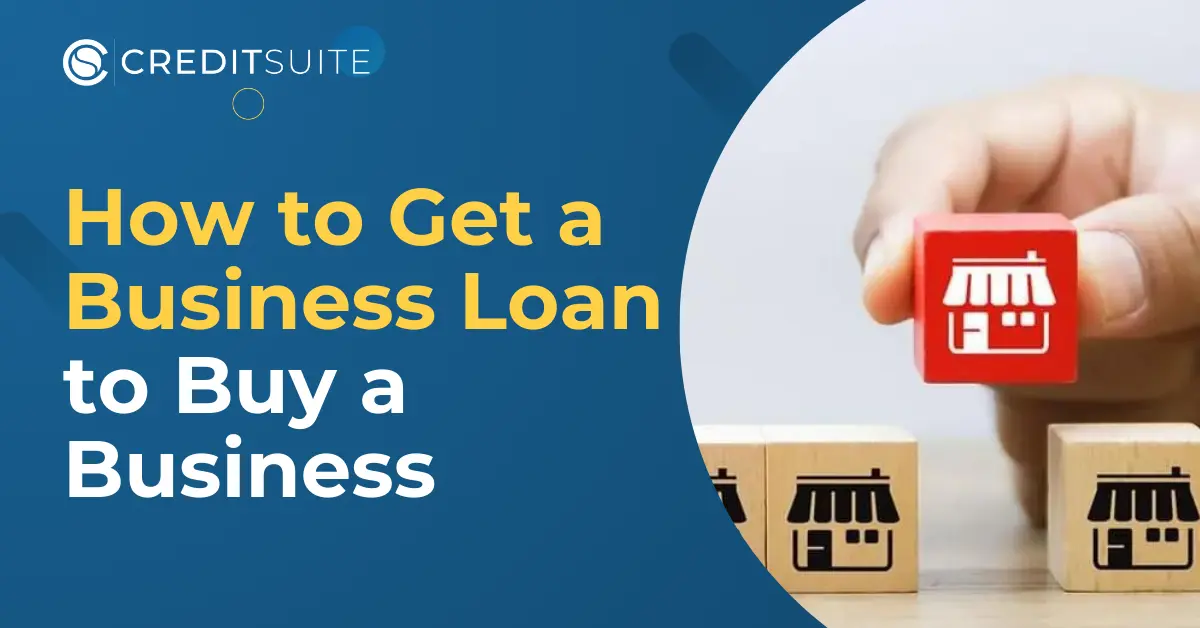Getting a business acquisition loan, or a loan to buy an existing business, is a somewhat different animal than getting a regular startup business loan.
It’s certainly different from applying for other types of business credit, like vendor credit or credit cards.
There are plenty of options, but it can take some careful consideration and research to figure out which loan option will work best for you.
What’s your best option for a business loan to buy a business?
5 Ways to Get a Business Loan to Buy a Small Business
 You do not have to get a conventional loan, or a traditional term loan, to buy an existing business. You can use other types of funding for business acquisition. Sometimes, it takes combining a couple of options to get the best funding for your specific needs.
You do not have to get a conventional loan, or a traditional term loan, to buy an existing business. You can use other types of funding for business acquisition. Sometimes, it takes combining a couple of options to get the best funding for your specific needs.
While credit cards or vendor credit wouldn’t work well, business owners often use a combination of term loans, lines of credit, and even seller financing to get the job done.
Traditional Business Term Loan
A traditional business term loan is a decent first stop when you are trying to figure out how to get small business loans to buy an existing business.
When you start considering a business acquisition, you’ll likely begin looking for this type of loan from a bank or credit union.
You’ll have to meet cash flow, annual revenue, time in business and other requirements for approval. You’ll also need to submit a business plan.
This is of course going to look different than if you were submitting a business plan for a new business. However, the basics parts of a business plan will still need to be included.
Collateral-based Small Business Loans
These are some of the best small business loans available in terms of interest rates. They are secured by some asset that you own. Rates are lower, and business owners do not have to worry as much about personal credit.
The bank is taking on less risk due to the fact they can take possession of the asset if you default. The small business you are purchasing can be used as collateral for the loan.
However, there are other, outside of the box options, that you can use if needed.
Guarantor Business Acquisition Loan
Ask a friend or family member to act as a guarantor. They may let you leverage their assets in exchange for a percent of your business. They usually want less of a percent of your company than a venture capitalist would.
If you are going to get help from friends and family for business acquisition, asking them to sign on as a guarantor may be a better option than borrowing from them directly. This is not an uncommon practice for business owners.
SBA Loans
Qualified borrowers may be eligible for SBA loans. These are loans guaranteed by the federal government. Yet, funds are distributed through banks. The application process is more involved. However, interest rates are often better.
Typically, minimum credit score requirements for SBA loans are lower than what banks would offer without the government guarantee as well.
7(a) Loans
An SBA 7a loan is a federally funded business acquisition loan up to $5 million. Banks, credit unions, and other specialized institutions, in partnership with the SBA, process these loans and disburse the funds.
The minimum credit score to qualify is 680. There is also a required down payment of at least 10% for the purchase of a small business, commercial real estate, or equipment.
The minimum time in business is 2 years. In the case of startups, business experience equivalent to two years will suffice.
504 Loans
Through this program you can get a business acquisition loan up to $5 million. The loan term can range from 10 to 20 years. Funding can take from 30 to 90 days. They require a minimum credit score of 680.
The asset you are financing is the collateral for the small business loan. In addition, there is a down payment requirement of 10%. This can increase to 15% for a new business.
There is also a 2 years in business requirement, or management must have equivalent experience if the business is a startup.
Business Loan to Buy a Business: Alternative Lenders
Alternative lenders are lenders that are not traditional banks or credit unions. For example, a private or peer-to-peer lender would qualify as a non traditional lender.
This type of lender can work better than a bank for some, for various reasons. Often they will be able to fund faster, and there may be less stringent requirements. However, interest rates are typically higher.
One popular online lender that works well for funding to buy a small business is Lending Club. You can get a quote in less than 5 minutes, and funds are available in as little as 48 hours if approved. There are no prepayment penalties.
The loan amount can go up to $300,000, and you need a minimum credit score of 620. Of course, details like this change frequently, so be sure to check with any lender directly for the most up-to-date information on rates and fees.
Lending Club is only one option for business acquisition loans from an online lender. There are many out there, but you have to be careful.
There are some great lenders out there, but it’s easy to fall prey to a predatory lender in this industry.
It can be hard to tell the difference. To ensure you are working with a reputable lender, consider working with a business credit expert. They can help you find the best lender with the best products for your needs.
They can also help you figure out what you can improve to get the best rates and terms possible. This may include building business credit, or improving fundability some other way.
Rollover for Business Startups
This is a form of collateralized business acquisition loan that uses your existing 401(k) or IRA. This program uses IRS proven strategies. You will pay no tax penalties, and you still earn interest on your 401(k).
Rates are low, and this option usually has a quick closing and funding process as well.
Credit Suite offers excellent options for this type of 401(k) financing. You can get up to 100% of current retirement account value that’s “rollable” from a previous employer.
Terms can be up to 5 years, and rates as low as 5.25% (Prime + 2) + $1995 rolled in lender fee.
There are no credit requirements. If bad credit is blocking you from getting small business acquisition funding, this is your chance.
For the retirement account to qualify, you must no longer be contributing, no longer be employed by the issuing company, and you must have a minimum of $35,000 in the account.
Typically all that is required is a copy of the retirement account statement.
Seller Financing
Seller financing is another option for funding a business acquisition. Some sellers are willing to help buyers by bridging the gap with seller financing. Sometimes a seller will sell a small business solely on seller financing.
Typically in these transactions, you pay at least one-third of the sale price up front. Then, the buyer makes payments for the rest directly to the seller, plus interest.
Sometimes, a bank may be willing to lend this lesser amount, the amount of the down payment only, when they will not lend the entire selling price.
The reason for this is twofold. First, the lower amount means less risk for the bank. However, banks also see that if a seller is willing to finance, then they have faith that the small business will continue to produce a profit into the future.
This is seen as a positive.
Using the Credit Line Hybrid to Help Fund a Business Purchase
That said, here is another option to get funding to buy a small business. The Credit Line Hybrid is a business credit card stacking program that offers no-doc, unsecured small business financing.
You can get up to $150,000 on these credit cards. In some circumstances, interest rates can be as low as 0% for a limited amount of time. This can be used as some or all of the down payment required for an SBA loan or seller financing.
The interest rate could be substantially lower than using a bank loan. Furthermore, you can take on a credit partner. This is helpful if you do not meet the 700 minimum credit score or some of the other requirements for this type of business financing.
While this option is typically recommended for other uses, such as cash flow management, or purchasing inventory, it can work for business acquisition as well.
HELOC and HEL
Borrowers who have a minimum credit score of at least 620 and at least 20% equity in their home can usually get a home equity loan (HEL) or home equity line of credit (HELOC).
This is a personal line of credit, not a business line. You can use funds from this type of loan to buy a small business, but your house will be on the line. Still, a line of credit of any kind can be helpful when it comes to managing cash flow.
If you have the option of 401(k) financing or seller financing combined with the Credit Line Hybrid, that may be better.
Find the Right Small Business Loan to Buy a Business
There are a lot of options for buying a small business. Of course, you can’t really fund an acquisition with an option like invoice financing or merchant cash advance.
But, you could use your equipment financing to purchase the equipment that comes with the business.
The key is to find the business financing option, or combination of options, that work best for you and your needs.
Credit Suite can help you figure out whether that’s a line of credit, a secured loan, The Credit Line Hybrid, or some other type of funding.



It's good to know that we'd seek a financing option that fits our needs. My oldest cousin is interested in expanding her business by buying an existing one in two months, so she's looking for the right loan for the project. I think she'd benefit from your intake on seeking equipment financing, so I'll suggest it while she finds a loan broker.